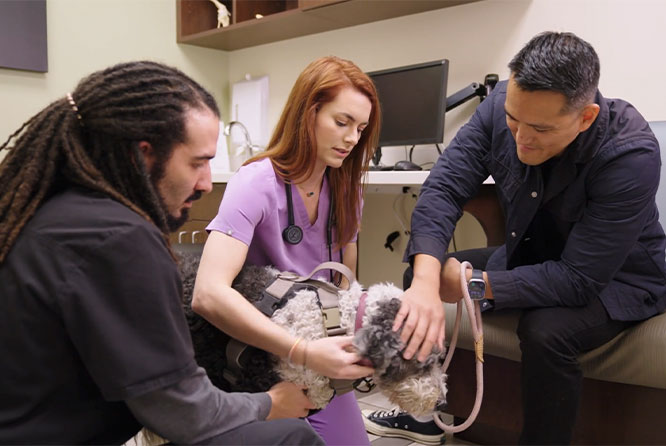Battle Heartworm and Lyme Using Antech’s Accuplex® — a Q&A with Dr. Philip Bosse

Warm air is moving in. Days are getting longer. People and their pets are emerging from their winter dwellings. Summer is almost here, and while it’s enjoyed by people and pets alike, it’s also enjoyed by fleas, ticks, and mosquitos.
In its Spring 2022 report, the Companion Animal Parasite Council (CAPC) warned that vector-borne diseases including heartworm, Lyme disease, Ehrlichiosis, and Anaplasmosis would pose higher-than-average risks across most of the U.S. this year. This increased risk of disease prompts a new eagerness to explore the most advanced prevention, diagnosis, and treatment options available.
Antech’s Accuplex Platform Raises the Standard for Lyme Detection and Heartworm Detection
The conversation surrounding fleas, ticks, and heartworms needs to be top-of-mind, especially with all the related complications, including dermatitis, anemia, Lyme, and vector-borne diseases. For pet owners, the out-of-site out-of-mind mentality can creep its way in just as stealthily as a tick hiding in their dog’s fur.
All it takes is one.
Accuplex detects Lyme disease, heartworm, Ehrlichia, and Anaplasma in dogs and includes the capability to screen for C6 antibodies. The C6 peptide exists in the invariable region (IR6) of the VIsE surface lipoprotein of Borrelia burgdorferi and is only expressed following natural infection or exposure of a host.
Accuplex is accurate and highly sensitive when it comes to heartworm detection — this is particularly important for pet owners in highly heartworm-endemic areas.
We asked Antech Professional Services Veterinarian, Dr. Philip Bosse, about Accuplex and why pet owners and clinicians should be excited about its capabilities.
Talking Accuplex with Dr. Philip Bosse
- What does the increased risk of vector-borne diseases such as heartworm and Lyme disease mean for clinicians and pet owners?
For clinicians, it means we must become and remain vigilant even in areas not considered endemic for these diseases. With the increasing geographical ranges of these vectors (ticks and heartworms) and increasing travel of pets within the U.S. and abroad, there are almost no pets free from potential exposure.
For pet owners, this highlights the need for year-round use of preventions and regular screening tests for pets to catch these infections where no clinical signs are noted.
- What is Accuplex, and why is it considered an advanced option for heartworm and Lyme prevention?
Accuplex is a reference laboratory test used to screen for Lyme disease, heartworm, Ehrlichia, and Anaplasma. Now with C6, Accuplex offers gold-standard Lyme disease detection, along with the highest sensitivity for heartworm screening even when the worm burden is very low.
The test is also a multiplex platform, meaning the test detects both antibodies and antigens. It also indicates that we look for multiple markers per organism and run simultaneously for greater robustness and sensitivity.
- How does Accuplex stand out compared to other solutions on the market today?
An element that sets Accuplex apart from other solutions is that it’s equipped to screen for C6 antibodies. C6 protein is identified as an accurate indicator of a dog’s exposure to Lyme (Borrelia burgdorferi), not present in vaccination-initiated responses.
Additionally, Accuplex screens for specific Ehrlichia canis and Anplasma phagocytophlium antibodies, which reduces confusion from exposure to other Ehrlichia or Anaplasma species that may be of lesser concern in dogs.
- What specific characteristics does Accuplex possess that make it so important for clinicians to consider offering regularly?
Accuplex covers more than just heartworms! It is more likely for a dog to test positive for Lyme, Anaplasma, or Ehrlichia than testing positive for heartworm disease. Stand-alone heartworm testing is not the norm anymore. Accuplex really is a necessary tool for ensuring thorough screening for vector-borne illnesses.
- What are the key elements clinicians need to understand about Accuplex? How is it a breakthrough in improved outcomes for pets regarding prevention, diagnosis, and treatment?
Accuplex is a breakthrough because of its advanced technology for Lyme detection, ultra-high sensitive heartworm screening capabilities, highly specific detection of E. canis, and its early and reliable detection of Anaplasma phagocytophilum.
But what clinicians need to understand is that this is a screening tool. This test is best used for identifying sub-clinical or asymptomatic animals. After recognizing seropositivity, you should consider a workup including a complete blood count (CBC), serum chemistry, and urinalysis with a Urine Protine:Creatine (UPC) ratio to understand the full scope of impact on the dog. Depending on the organism the dog was exposed to, a CBC and UPC should be repeated at regular intervals.
- Should Accuplex be seen as a seasonal solution or a year-round tool? Why?
Accuplex should be used as a year-round tool, without a doubt! With the expansion of geographic ranges of these vectors, including the changes in animal migratory patterns, exposure is happening year-round and in more areas than ever before. Additionally, pets travel with their owners, which also increases the potential for exposure.
- High sensitivity is paramount for heartworm screening tests. Why is Accuplex the best diagnostic heartworm option available?
Accuplex is able to detect heartworm-positive dogs that have infections with low worm burdens. This means that Accuplex is sensitive enough to detect heartworms in dogs that have as few as one or two female adult heartworms. Additionally, when a positive is discovered, Antech automatically double-checks to confirm. We are committed to providing only accurate answers!
- Why should clinicians be excited about Accuplex?
Accuplex is a game-changer. Its high sensitivity and advanced screening capabilities make a big impact on diagnosis and treatment. It’s a test that certainly raises the standard of care, and I can’t wait for clinicians and their patients to experience it. And since it was first offered, Accuplex has been continuously updated to reflect advances in technology and medicine.
About Dr. Philip Bosse
Philip Bosse, DVM was born and raised in the coastal plains region of North Carolina where he discovered his passion for science and, at an early age, decided to pursue veterinary medicine. He obtained his Bachelor of Science in Animal Science from North Carolina State University, while also getting his first job in the veterinary field as a kennel assistant. Additionally, he became an assistant in a microbiology lab on the veterinary college campus while an undergraduate, which led to him pursuing his Doctor of Veterinary Medicine degree at NC State University’s College of Veterinary Medicine, which he completed in 2008.
Immediately following graduation, Dr. Bosse completed a small animal rotating internship at VCA’s Veterinary Referral and Emergency Center in Norwalk, CT. This granted him invaluable experience and mentorship in multiple disciplines including internal medicine, emergency medicine, and surgery.
Dr. Bosse then moved west to the San Francisco Bay area. Here he continued to hone his skills as a small animal veterinarian and diagnostician. He has greatly benefited throughout his time here by having been a long-time associate veterinarian at a DACVIM-owned practice and working closely with specialists of many disciplines in the area. Dr. Bosse joined Antech in October of 2021 as a Professional Services Veterinarian.
When not practicing medicine, Philip enjoys spending time outside hiking, fishing, and playing beach volleyball.
With Accuplex, heartworm and Lyme don’t stand a chance
Blog Posts Straight to Your Inbox!
Tune in monthly to read our blog post or give us your email to send straight to your inbox.




